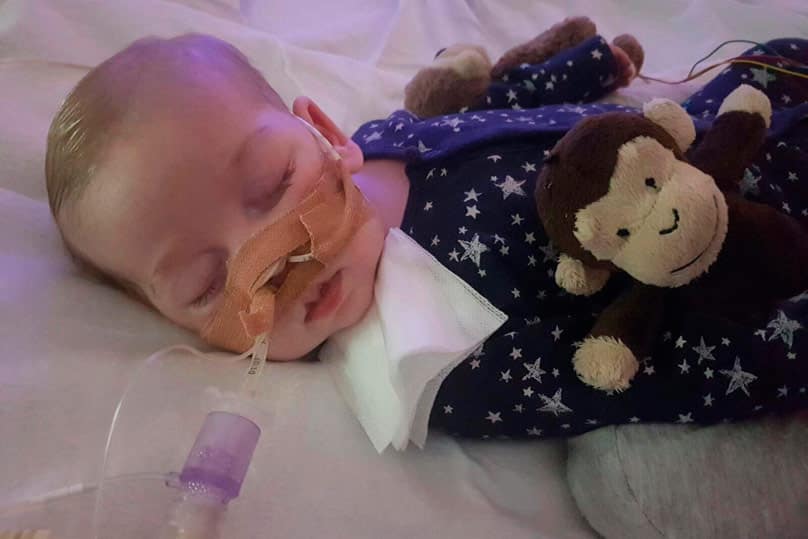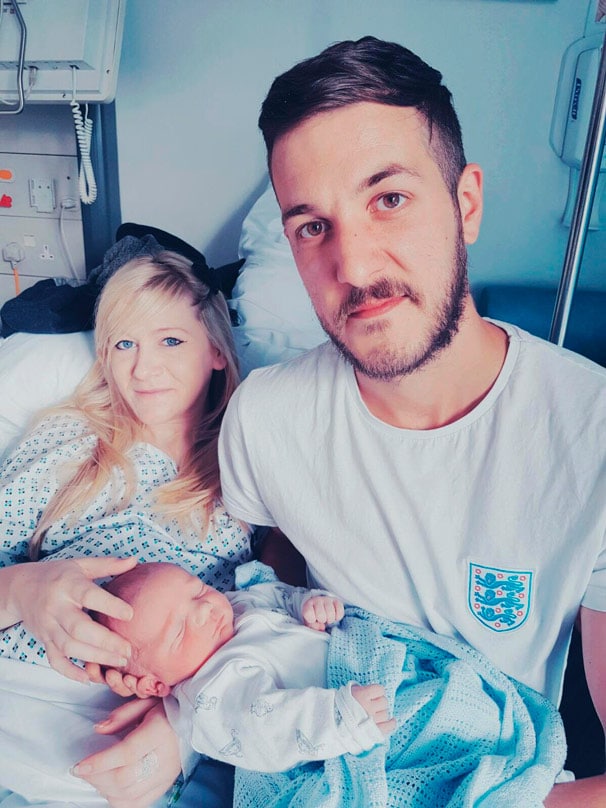
It is a dreadful thing to be careless or callous in matters of life or death. It is also a dreadful thing to be careless or callous when speaking about these matters. The secular world may be guilty about the former, but in the case of Charlie Gard, many in the Catholic world are guilty of the latter.
It’s a heartrending story of a UK baby born with the extremely rare Mitochondrial DNA Depletion Syndrome, a degenerative, fatal condition for which there is no known treatment or cure.
Charlie Gard is now eleven months old, and his doctors believe his condition is untreatable, irreversible, and fatal. They advised his parents to remove his ventilator, because they think further treatment is futile and is causing the child pain. The parents raised almost two million dollars to fund an experimental procedure in the US, although the doctor who has offered to try to treat Charlie has never examined him. Charlie has an exceptionally rare variety of MDDS, and the proposed experimental treatments are only effective on some patients with a different variety of the condition.
In April of 2017, a UK court ruled that it would not be in Charlie’s best interest to undergo a trip or further medical procedures, and they have allowed the hospital to decide whether to remove life support. As of today, the parents are not allowed to take their baby out of the hospital, and the hospital intends to remove his ventilator, and will give him only palliative care until he dies.

That is the legal side of it, and it’s understandably causing alarm and outrage, especially among parents of children with severe disabilities. It’s dreadful enough for parents to be faced with life-or-death medical decisions, but it’s even more dreadful to have that decision wrested away from them. Bambino Gesu, “The Pope’s Hospital,” has offered to take Charlie Gard in so as to allow the parents to be the ones to make decisions about him. He is their child.
Here, I will not discuss the question of parental vs. state authority in life-or-death decisions. I only want to talk about the life-or-death decisions themselves, and I want to challenge the brutally simplistic narrative that there are two sides: People who want to treat Charlie further, who are good, and people who want to withdraw Charlie’s life support, who are bad.
It’s not so simple.
It is not “murder,” as many pro-life headlines proclaim, to take a terminally ill patient off a ventilator, nor is it euthanasia. Every case is different, and must be judged on its individual ethical and medical merits. It is morally permissible, and may be the more compassionate choice, to decide that further treatment is too burdensome. We may not directly kill, and we may not withdraw food or hydration to bring about death; but we may choose to stop impeding death, even without exhausting every possible treatment first.
Euthanasia must be distinguished from the decision to forego so-called “aggressive medical treatment”, in other words, medical procedures which no longer correspond to the real situation of the patient, either because they are by now disproportionate to any expected results or because they impose an excessive burden on the patient and his family. … It needs to be determined whether the means of treatment available are objectively proportionate to the prospects for improvement. To forego extraordinary or disproportionate means is not the equivalent of suicide or euthanasia; it rather expresses acceptance of the human condition in the face of death.
It is not “eugenics,” as Catholic Vote suggests, to decide that a patient should not be subjected to procedures we judge more likely to cause harm than good. It is eugenics to decide that a disabled person would be better off dead; it is not eugenics to decide that a dying person should be allowed to die.
When a doctor or hospital urges a guardian to remove life support, this is not clear evidence that they are heartless angels of death who care only for money and convenience. In fact, a doctor who urges more procedures may be the predatory one. There is a phenomenon called “the therapeutic misconception,” when a patient or guardian doesn’t understand the difference between research and treatment, and may not realise that the care being offered is primarily an experiment to gather information, and not an effort to treat the patient.
Whether Charlie Gard’s parents are suffering from the therapeutic misconception, I do not know; but I can well imagine that it’s almost impossible to think clearly about what is in the best interest of their child; and the media circus and passionate opinion pieces swirling around their story can only be making it harder. Grieving, exhausted, emotionally ravaged parents of gravely ill children are incredibly vulnerable to unscrupulous or overzealous researchers, and well-meaning pro-lifers shouting in protest are not helping to clarify the Church’s true teaching.
I urge readers to look over the court documents regarding Charlie Gard—not to illuminate the question of who should make the decision about his care, but to flesh out our understanding of why the UK doctors are opposed to continuing treatment:
- “There is unanimity among the experts from whom I have heard that nucleoside therapy [the experimental procedure offered in the US] cannot reverse structural brain damage. I dare say that medical science may benefit objectively from the experiment, but experimentation cannot be in Charlie’s best interests unless there is a prospect of benefit for him.
- The Great Ormond Street Team [at the UK hospital] believe that Charlie can probably experience pain, but is unable to react to it in a meaningful way. Their evidence was that being ventilated, being suctioned, living as Charlie does, are all capable of causing pain. Transporting Charlie to the USA would be problematic, but possible. Subjecting him to nucleoside therapy is unknown territory – it has never even been tested on mouse models – but it may, or may not, subject the patient to pain, possibly even to mutations. But if Charlie’s damaged brain function cannot be improved, as all seem to agree, then how can he be any better off than he is now, which is in a condition that his parents believe should not be sustained?”
According to Church teaching, based on the information above, it would be entirely ethical and most likely the compassionate choice for a rightful guardian to decline further treatment and to remove Charlie’s ventilator, to give only palliative care, and to allow the poor baby to die as peacefully as possible. He is not merely disabled; he is dying and very likely suffering as he dies.
Pro-lifers are rightly alarmed to see the state superseding the parents’ authority to make this decision. But the decision itself is not intrinsically immoral. If a rightful guardian made the decision that the hospital has made, it would be neither murder nor eugenics nor cruel nor brutal nor heartless nor part of the culture of death. It would simply be bowing to mortality—as the Pontifical Academy for Life said, “recognis[ing] the limitations of what can be done,” in hopes of sparing a helpless baby more suffering.
The eugenic spirit is alive and well in the 21st century. We do well to be on guard, to fight back against a hellish utilitarianism that clamours to snuff out every life it deems unworthy. Too often, “death with dignity” means “death for the convenience of the living;” and when the state appoints itself the arbiter of life and death, there is good reason to fear. We do well to be on guard.
But when these decisions come before us, they are rarely black and white. When we are faced with them, we are called to pray, to consult experts, and to do the best we can, entrusting our hearts to the Holy Spirit. And when we hear stories about other people’s decisions, we should be exceedingly careful not to increase their suffering by jumping to conclusions.
We must not cry “murder!” when what we are really facing is simple mortality. This is part of the effects of original sin: Not only mortality, but uncertainty, even when our motives are good.
